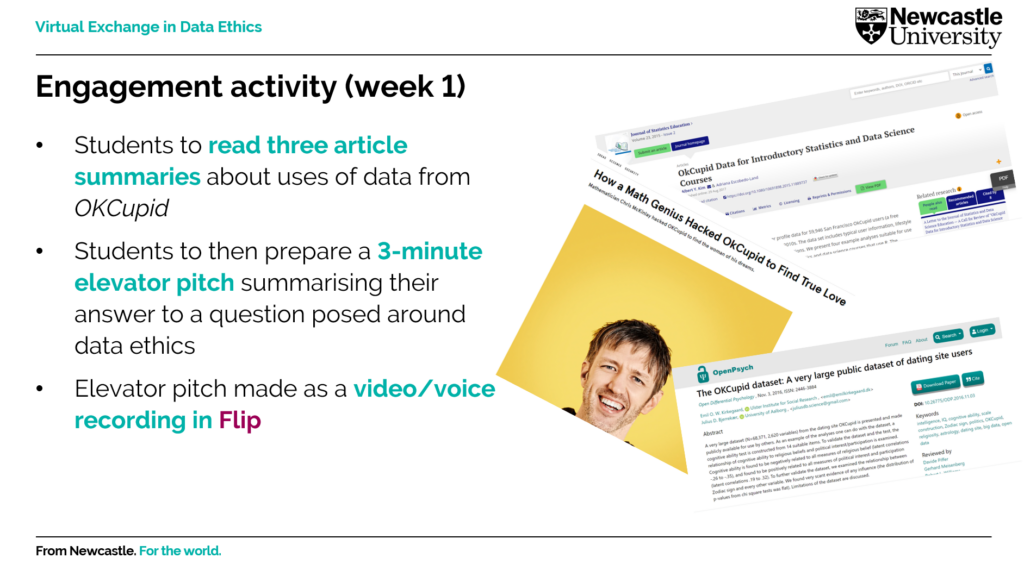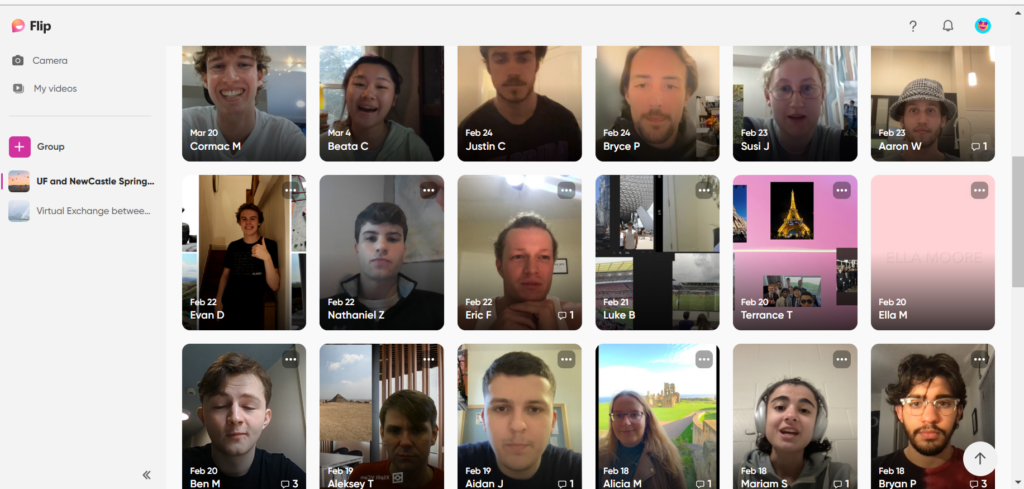Lee Fawcett (Senior Lecturer)
School of Mathematics, Statistics and Physics
Science, Agriculture and Engineering
What did you do?
We developed a short virtual exchange course around the use/misuse of data.
Who is involved?
University of Florida – Paloma Rodriguez and Carrie Martins (University of Florida Office of Global Learning) and Megan Mocko (Lecturer, Warrington College of Business). And UG students in Mathematics/Statistics/Physics at both Newcastle University and the University of Florida.
How did you do it?
With the support of a Newcastle University Virtual Exchange Fund grant, I was able to visit prospective VE partners in the US and attend a 6-week online VE training course organised by the University of Florida Office of Global Learning. By the end of the course I had a VE partner from the University of Florida and together we had developed a short VE opportunity in Data Ethics that would have broad appeal to both of our students. At Newcastle, this was piloted as an optional mobility opportunity for undergraduate students in the School of Mathematics, Statistics & Physics; it was attached to a zero-credit “skills” module, and around 40 Newcastle students engaged. The VE project was completely asynchronous, with students posting, and commenting on, video responses to source material on FlipGrid.

An engagement activity
Why did you do it?
Students’ appetite for mobility has grown considerably since the pandemic, but not all students have equitable access to physical mobility opportunities such as study abroad. The aim of this VE project was to “test the water”; firstly, to investigate the processes involved in setting up a VE opportunity, but also to pilot a small-scale VE project with undergraduate students in a discipline which is under-represented in terms of student mobility (Mathematical Sciences). More generally, VE is a key part of the global strategy in the School of Mathematics, Statistics & Physics, as we look to embed intercultural awareness into our undergraduate curriculum.
Does it work?
Yes, I think it does! Although this particular VE project formed part of a small-scale pilot study, undergraduate uptake was better than expected (partly because it was embedded within a timetabled module) and feedback from both Newcastle and Florida students and staff involved has been extremely positive.

Students engaging with the virtual exchange
As part of the University of Florida VE training course, we were encouraged to construct rubric for assessing students’ development of intercultural competencies; even in this two-week exchange, pre- and post- project surveys reveal evidence of a positive impact here. The online discussions revealed diverse opinions in what is ethical in terms of the public availability of large datasets, as well as students’ inquisitiveness in the thoughts and beliefs of students at the overseas institution.
Student Voice
Feedback from two stage 1 students:
Ben Rushes, Stage 1 BSc Mathematics and Accounting:
“Really nice to see how students in America lived, what their halls were like etc.”
“It was interesting to see how different opinions were in the US [about data ethics] versus ours in the UK”
“The highlight for me was… people commenting on my presentation; realising the stuff that I had missed and not quite thought about enough, and to see people who had slightly different perspectives [on data ethics]”
“The virtual exchange was so rewarding because you were able to see the different perspectives from people [on data ethics]”
“It was good in terms of making friends and stuff – even people from my own course here at Newcastle”
“I’ve definitely developed as a person – it’s working on skills that you need – presentation skills, working collaboratively as a team with students from a different country”
“It didn’t interfere with any of my classes and I was able to do it in my own time”
“Seeing the perspective from the American students was really fascinating for me”
“I found that… the US students were happy to have data displayed everywhere, whereas the UK students were more… reserved and quiet… and had a more private view of things”
Matthew Catnach, stage 1 BSc Mathematics:
“I really liked that the virtual part was done through flip where we could upload the videos in our own time and spend time making sure the videos included what we wanted”
“Also it was good to have the subject be something different from any of my current modules as it was something new to research which I enjoyed”
The Graduate Framework
The virtual exchange course demonstrated the following attributes:
- Critical thinkers
- Digitally capable
- Curious
- Collaborative
- Engaged
